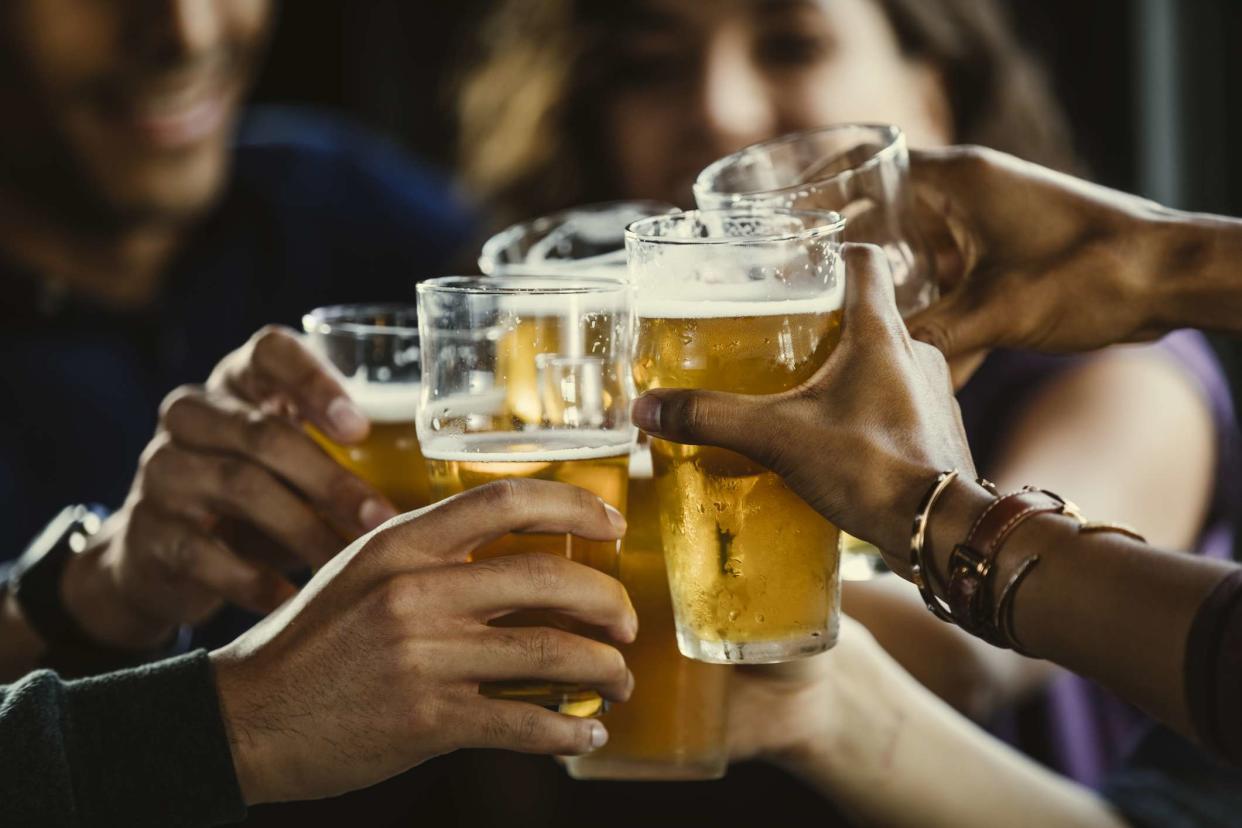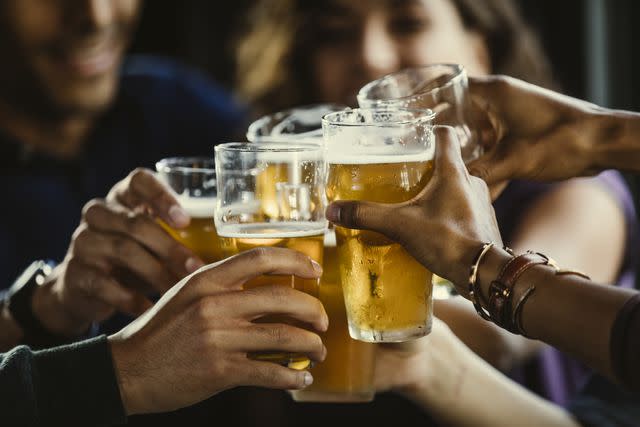Does Alcohol Trigger Eczema?

The Good Brigade / Getty Images
Medically reviewed by Casey Gallagher, MD
No research has confidently linked alcohol to new or worsening eczema flares (increases in symptoms). However, there are anecdotal reports that people with eczema experience a flare after drinking alcohol and have an improvement in their condition after avoiding alcohol.
Some studies of nummular (discoid) eczema found an association between drinking alcohol and a flare. The American Academy of Dermatology lists heavy alcohol drinking as a possible cause of a flare of nummular eczema.
Eczema, also known as atopic dermatitis, is a chronic skin condition that causes red, flaky, discolored skin or dry skin patches. A flare can be brought on by internal and external factors.
Experts know a lot about how alcohol and the skin interact to understand why eczema symptoms might get worse and what you can look out for to avoid flares in the future.
This article will explain how alcohol consumption may cause eczema to flare and what you can do to help put your eczema into remission.

The Good Brigade / Getty Images
Alcohol, Eczema, and the Immune System
Alcohol, the immune system, and the skin interact with one another. Here are a few reasons why scientists suspect a link between drinking alcohol and experiencing eczema symptoms:
Histamines: The immune system produces compounds called histamines in response to an allergy or injury. They are also released when breaking down alcohol. When histamines are triggered, inflammation, itching skin, redness, or discoloration can result.
Dehydration: Dehydration from alcohol doesn't just mean you're thirsty in the morning. Alcohol consumption can also lead to loss of moisture in the skin. The skin has an important role in retaining water. It's no secret that when already dry skin loses even more moisture, it gets itchy, causing a cycle in people with eczema.
Slows skin healing: The skin protects you against harmful environmental factors, like pathogens that cause infections. Alcohol has been proven to disrupt the skin barrier. With an already compromised skin barrier, those with eczema may see a slower healing time and also increase their risk of infection.
Known Skin Conditions Triggered by Alcohol
Eczema isn't the only skin condition that appears to be triggered by drinking. Psoriasis, rosacea, and porphyria cutanea tarda have been linked to alcohol misuse as well.
Psoriasis studies show that the amount and frequency of drinking may be related to the severity and onset of the condition. Another study found that alcohol intake, specifically liquor and white wine, was associated with an increased risk of rosacea in women.
More research is needed to understand how alcohol can impact these skin conditions, but studies show that the body responds in similar ways: increased susceptibility to infections, stimulation of immune cells, and inflammatory responses.
Alcohol and Eczema Medication Interactions
It's always risky to mix alcohol with medications. Dinking on medication can change the effectiveness of the medication and tax the liver, among other dangerous effects.
Here are some specific alcohol-eczema medication interactions to be aware of:
Antihistamines: Antihistamines can prevent eczema flares. Mixing these medications with alcohol can cause sleepiness and impaired focus.
Antibiotics: Antibiotics are prescribed to treat or prevent skin infections. Drinking can limit their effectiveness and lead to other side effects.
Corticosteroids: Corticosteroids are used for a short period to suppress the immune system and get an eczema flare under control. Since alcohol and corticosteroids both suppress the immune system, they put you at high risk of infection and illness.
Biologic drugs: Some people with eczema regularly take medications to improve their immune system function. There isn't much research on how biologics interact with alcohol. People are often advised to steer clear of alcohol.
Eczema From Alcohol: Does It Depend on the Type?
It's not uncommon to have both eczema and food allergies (or sensitivities). A 2017 study found that a large percentage of people with eczema have some form of food allergy.
People with eczema may have an intolerance to a naturally occurring component in alcohol called histamines. Histamines are also found in fermented foods (like cheese) and drinks. Alcohol is broken down by the body into acetaldehyde, which can stimulate the release of histamines.
Histamines are responsible for cueing allergic reactions in the body (like inflammation in the skin). That's why some people with histamine intolerance will get a "red wine headache." Others, especially those with existing skin conditions, may experience an increase in itchy skin.
If you notice itching after drinking, consider switching to a mocktail or low-histamine alcohol, such as vodka. Avoid red wine, beer, and aged liquor, which all have a high level of histamines.
Tracking Your Triggers
Keeping track of your daily habits, food, and stress can help you narrow down the impact each has on your eczema. When it comes to determining your reaction to alcohol, try using a food and drink journal to track when flairs occur.
Consider keeping a close eye on other ingredients in drinks, such as mixers, fruits, or flavorings, too. You may be reacting to a different food source rather than, or in addition to, alcohol.
Drink Responsibility
Being aware of when and how often you drink is also important. There's mounting research linking chronic skin conditions with alcohol misuse. A 2021 study found an alcohol use disorder in 23% of people with eczema and 28% of people with psoriasis.
Some studies highlight how eczema and other chronic skin conditions can affect mental health. Others note the connection between liver function, the skin, and eczema.
Whatever your case, find what works. Maybe that includes adding more stress-reducing or confidence-boosting activities to your life, seeing a therapist, or just being more mindful of why you're drinking in the first place.
Summary
There is no research linking alcohol consumption to eczema flares or new cases of eczema. But medical observations and personal anecdotes are encouraging more research every day. Experts may not fully understand why eczema gets worse after alcohol consumption, but they know how alcohol and the body interact.
Food sensitivities, dehydration, histamine intolerance, and overall low liver function are all factors in alcohol-induced eczema flares. Track your alcohol intake and find what works for you.
Frequently Asked Questions
Which beverages help eczema symptoms?
Consuming plenty of water can help keep your skin hydrated. Consider avoiding alcohol, dairy, and high-sugar drinks.
Is itching after drinking due to an allergy?
In short, yes. Alcohol contains histamines (and histamine-inducing compounds), which are responsible for cuing allergic reactions in the body. These inflammatory reactions range from headaches to itchy skin.
How do you cure eczema quickly?
While there is no cure for eczema, there are ways to get a flare under control. Hydrocortisone cream, moisturizers, and antihistamines are a good place to start. Your healthcare provider can prescribe topical or oral steroids. Long-term, consider getting a food and environmental allergy test. It is possible to put this chronic condition into remission.

